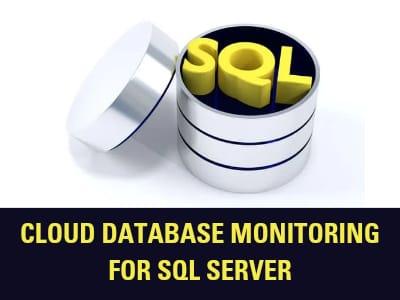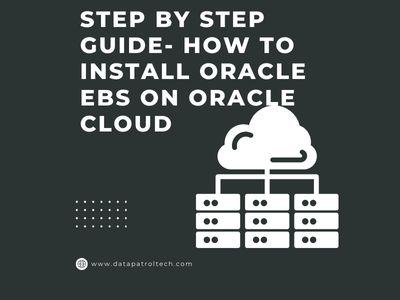- January 9, 2024
by Gauri Wahab - Sales & Marketing Officer
- Understanding the Shift to Cloud Databases:
- The Essence of Database Monitoring
- Cloud Database Monitoring Tools
- Oracle Cloud Database Services
- Choosing the Right Cloud Database Monitoring Tool
- Conclusion

In the dynamic landscape of modern businesses, data forms the backbone of operations, and databases play a pivotal role in managing and storing this invaluable asset. As organizations increasingly migrate their databases to the cloud, the need for robust monitoring tools becomes paramount. This blog delves into the reasons why cloud database monitoring tools for Microsoft SQL Server are invaluable in today's digital era, exploring their role in ensuring optimal performance, security, and efficiency.
1. Understanding the Shift to Cloud Databases:
The evolution of cloud computing has revolutionized the way businesses handle their data infrastructure. Cloud databases offer scalability, flexibility, and cost-effectiveness compared to traditional on-premises solutions. Microsoft SQL Server, a stalwart in the relational database management system (RDBMS) realm, has seamlessly embraced the cloud paradigm, providing organizations with SQL Server cloud database services tailored to meet their diverse needs.
2. The Essence of Database Monitoring:
Database monitoring is the proactive practice of observing and analyzing a database environment's health, performance, and security. In the context of cloud databases, monitoring becomes even more critical due to the distributed nature of resources and the dynamic scaling capabilities offered by cloud services. Effective monitoring ensures that databases operate optimally, minimizing downtime, enhancing performance, and safeguarding against potential security threats.
3. Cloud Database Monitoring Tools: A Necessity
-
Performance Optimization:
Cloud database monitoring tools empower organizations to track and analyze the performance metrics of their SQL Server databases. This includes monitoring query execution times, resource utilization, and identifying bottlenecks. By gaining insights into performance patterns, businesses can optimize their databases for enhanced responsiveness.
-
Security Assurance:
Ensuring the security of sensitive data is a top priority for organizations. Cloud database monitoring tools for SQL Server enable continuous security surveillance, detecting unusual activities or potential security breaches. This proactive approach allows for timely response to mitigate risks and protect critical business information.
-
Efficient Resource Utilization:
Cloud environments offer the advantage of scalable resources, allowing organizations to adjust their infrastructure based on demand. Monitoring tools help in tracking resource utilization trends, ensuring efficient allocation of resources and preventing unnecessary costs.
-
Real-time Alerting:
Cloud database monitoring tools provide real-time alerts for anomalies or performance deviations. This proactive alerting mechanism enables IT teams to address issues promptly, minimizing the impact on business operations.
-
Compliance and Auditing:
Many industries have stringent compliance requirements. Cloud database monitoring tools assist in tracking and documenting activities within the database environment, facilitating compliance audits and ensuring adherence to regulatory standards.
-
Cost Management:
Cloud services often operate on a pay-as-you-go model. Monitoring tools help organizations optimize their cloud spending by identifying underutilized resources, recommending right-sizing, and providing insights into the cost implications of database activities.
Oracle Cloud Database Services: A Comparative Glance:
While the focus here is on Microsoft SQL Server, it's worth noting that cloud database monitoring tools often support a variety of database management systems. Oracle Cloud Database Services, a major player in the cloud database arena, offers similar monitoring capabilities. Organizations managing heterogeneous database environments can benefit from unified monitoring solutions that cater to multiple platforms.
Choosing the Right Cloud Database Monitoring Tool
- Compatibility:
Ensure the monitoring tool is compatible with Microsoft SQL Server and seamlessly integrates with your chosen cloud platform.
- Scalability:
A good monitoring tool should scale with your business, accommodating the growth of your SQL Server databases and adapting to changes in demand.
- Security Features:
Prioritize tools that offer robust security features to protect sensitive data and ensure compliance with industry regulations.
- User-Friendly Interface:
Opt for tools that provide a user-friendly interface, making it easy for both database administrators and IT teams to navigate and extract meaningful insights.
- Automation Capabilities:
Look for tools that offer automation features to streamline routine tasks, such as performance tuning, backup scheduling, and security checks.
In Conclusion:
In the era of cloud computing, where data is the lifeblood of businesses, effective database monitoring is non-negotiable. Cloud database monitoring tools for Microsoft SQL Server contribute significantly to database environments' overall health and performance. From optimizing performance and ensuring security to enabling efficient resource utilization, these tools are indispensable for organizations leveraging the power of SQL Server in the cloud.
As businesses continue to embrace cloud database services, investing in robust monitoring tools becomes a strategic imperative. The right tool not only safeguards the integrity and security of data but also empowers organizations to extract maximum value from their SQL Server databases in the dynamic and ever-evolving digital landscape.
Experience the unparalleled benefits of Cloud Database Monitoring with Data Patrol Technologies - Your Trusted Partner for Optimal Database Performance and Security to know more get in touch with us at info@datapatroltech.com or call us on 8484839896.


